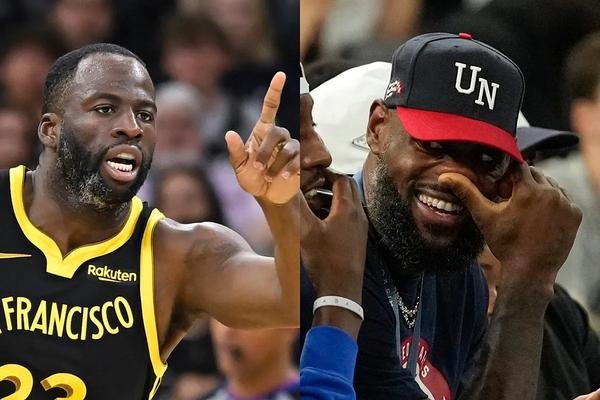**Title: Draymond Green Accuses NBA Insider of Being a ‘LeBron James Spy’: A Deep Dive into the Controversy**
In the ever-turbulent world of the NBA, where drama and intrigue often eclipse the on-court action, few incidents have stirred as much buzz as Draymond Green’s recent accusation against NBA insider Brian Windhorst. Green, the outspoken forward for the Golden State Warriors, alleged that Windhorst was acting as a “LeBron James spy,” a claim that has ignited debates across the sports media landscape. This article aims to explore the origins of this controversy, the implications for all parties involved, and the broader context of media influence in professional sports.
### **The Accusation Unfolds**
Draymond Green’s charge against Windhorst emerged from a series of social media posts and public statements. Green, known for his fiery demeanor and unfiltered commentary, suggested that Windhorst was biased in his coverage, particularly in favor of LeBron James, the superstar forward for the Los Angeles Lakers. Green’s contention was that Windhorst’s reporting was more aligned with James’ interests than with an impartial presentation of NBA news.
The catalyst for Green’s accusation appeared to be Windhorst’s reporting on recent developments concerning James and the Lakers. Windhorst, a well-respected NBA analyst and reporter for ESPN, had been vocal about various aspects of James’ career and his impact on the league. Green took issue with what he perceived as Windhorst’s excessive focus on James, which he argued was a reflection of a deeper, biased agenda.
### **The Broader Context**
To understand the full scope of Green’s accusations, it’s crucial to delve into the relationship between NBA players and the media. The NBA, like other professional sports leagues, operates in a media-driven environment where narratives often shape public perception. Reporters and insiders like Windhorst play a significant role in this ecosystem, providing insights and analysis that can influence how fans and other stakeholders view players and teams.
LeBron James, being one of the most prominent figures in the NBA, inevitably attracts a great deal of media attention. His impact on the game and his cultural significance make him a frequent subject of discussion and analysis. However, this intense focus can sometimes lead to perceptions of bias or favoritism, especially from rivals or those with competing interests. Green’s accusation taps into this dynamic, suggesting that Windhorst’s coverage is not just about reporting news but about promoting a particular narrative.
### **Brian Windhorst’s Role**
Brian Windhorst has been a prominent NBA insider for many years. His relationship with LeBron James is well-documented, having covered James throughout his career, from his time in Cleveland to Miami, and now Los Angeles. Windhorst’s access to James and his insights into the superstar’s career have established him as a go-to source for information related to James.
Windhorst’s reporting is often detailed and nuanced, reflecting his deep knowledge of the league. However, this proximity to James has also led to accusations of partiality. Critics argue that Windhorst’s frequent focus on James could overshadow other important stories or create an impression of undue favoritism. In Green’s case, this perception seems to have boiled over into a direct accusation of espionage.
### **Implications for the NBA Media Landscape**
Green’s accusation has broader implications for the relationship between players, media, and fans. First, it highlights the tension that can arise when players perceive media coverage as biased or self-serving. Such tensions are not new in sports journalism, but they underscore the challenges of maintaining journalistic integrity while covering high-profile figures.
Moreover, Green’s charge raises questions about the nature of media access and influence. Reporters often build relationships with players and teams, which can provide valuable insights but also lead to accusations of favoritism. This delicate balance is crucial in sports reporting, where objectivity is essential yet challenging to maintain.
For Windhorst, the accusation is a professional challenge. His credibility as a journalist is on the line, and how he responds to Green’s claims will be closely scrutinized. Windhorst’s ability to navigate this controversy while continuing to provide accurate and balanced coverage will be a test of his journalistic integrity.
### **The Role of Social Media**
Social media plays a significant role in amplifying and accelerating such controversies. Green’s accusations, initially a series of social media posts, quickly gained traction online. This rapid dissemination of information (and misinformation) can exacerbate tensions and influence public opinion in ways that traditional media channels cannot.
The immediacy of social media also means that controversies can quickly spiral out of control. Players, journalists, and fans engage in real-time discussions that can shape the narrative in unpredictable ways. In this environment, statements and accusations can have a far-reaching impact, affecting reputations and careers.
### **Conclusion**
Draymond Green’s accusation that Brian Windhorst is a “LeBron James spy” is more than a clash between a player and a journalist; it’s a reflection of the complex interplay between media, athletes, and public perception. As Green and Windhorst navigate this controversy, the broader implications for sports journalism and media ethics will continue to unfold. This incident serves as a reminder of the delicate balance required in covering high-profile figures and the significant role that media plays in shaping the narratives of professional sports.
